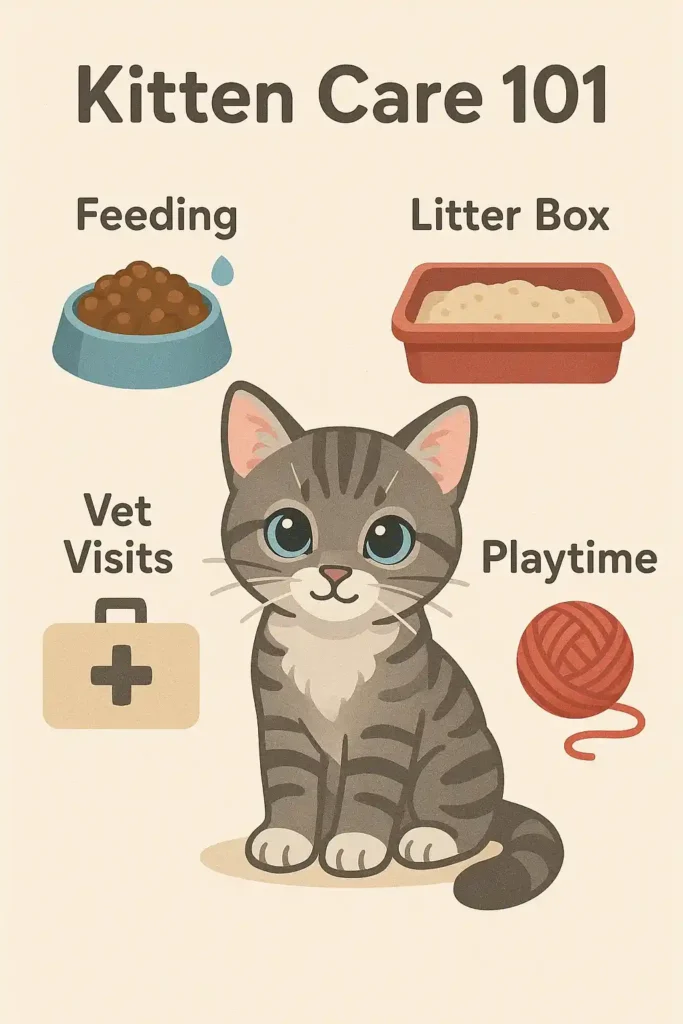
Bringing home a new kitten is an exciting adventure, but it also comes with responsibilities. Whether you’re a first-time cat owner or a seasoned pet parent, this complete Kitten Care 101 guide will help you raise a happy, healthy feline.
We’ll cover everything from preparing your home to nutrition, health, training, and bonding tips—ensuring your tiny furball grows into a confident, well-adjusted cat.
Section 1: Preparing for Your New Kitten (Bringing Them Home Safely)

Bringing home a fluffy little kitten? Exciting! But before those tiny paws step into your space, prep wisely. Start with a safe, cozy spot—think soft bedding, a litter box, and kitten-proofed corners. Your furball needs gradual adjustment, so avoid overwhelming them with loud noises or too many people.
Stock up on kitten essentials:
✔ High-quality kitten food (vet-recommended)
✔ Shallow water & food bowls
✔ Toys & scratching posts (to avoid couch casualties!)
Pro tip: Schedule a vet visit within the first week to check for vaccinations and deworming. A healthy start = a happy kitten!
Section 2: Kitten Nutrition – What & How to Feed Your Growing Cat
Kittens have high energy needs, so their diet must support rapid growth. Here’s what to keep in mind:
Best Food for Kittens
- Wet food (hydrating & easy to digest)
- Dry kibble (for dental health, but ensure it’s kitten-specific)
- Avoid cow’s milk (most kittens are lactose intolerant—opt for kitten formula if needed)
Feeding Schedule
- 0-4 weeks: Bottle-fed every 2-4 hours (if orphaned)
- 4-8 weeks: Wet food 4-5x daily
- 8+ weeks: 3-4 meals a day
Always provide fresh water and avoid overfeeding—obesity in kittens can lead to health issues later.
Section 3: Litter Training & Hygiene Tips
Kittens learn quickly, but they need patience and consistency.
How to Litter Train Your Kitten
- Choose the right box (low-sided for easy access)
- Place it in a quiet corner (away from food)
- Gently place them in after meals/naps (they’ll naturally dig)
If accidents happen, never scold—just clean with an enzyme cleaner to remove odors.
Read Also: Can Cats Drink Oat Milk?
Grooming Basics
- Brushing: Short sessions to get them used to it
- Nail trimming: Use kitten-safe clippers
- Ear & eye cleaning: Soft, damp cloth (check for discharge)
Section 4: Kitten Health & Vet Care (Vaccines, Deworming & Common Issues)
Preventive care is key to a long, healthy life.
Essential Vet Visits
- 6-8 weeks: First vaccinations (FVRCP)
- 12 weeks: Booster shots & rabies vaccine
- 16 weeks: Final kitten shots
Common Kitten Health Problems
- Fleas & worms (monthly preventatives help)
- Upper respiratory infections (sneezing, watery eyes)
- Diarrhea (could be diet-related or parasites)
Emergency signs: Lethargy, no appetite, labored breathing—see a vet immediately.
Read Also: Spaying a Cat: Everything You Need to Know
Section 5: Socialization & Playtime (Building a Strong Bond)
Kittens learn behaviors early—positive experiences shape their personality.
How to Socialize Your Kitten
✔ Handle them gently (paws, ears, belly)
✔ Introduce new people & pets slowly
✔ Expose them to different sounds (vacuum, doorbells)
Best Kitten Toys
- Interactive wands (mimics prey)
- Kick toys (for biting & bunny kicks)
- Puzzle feeders (mental stimulation)
Playtime = bonding time! Dedicate 15-30 minutes daily for interactive play.
Section 6: Kitten-Proofing Your Home (Safety First!)
Curious kittens get into everything. Secure these hazards:
Danger Zones to Check
- Electrical cords (use cord covers)
- Toxic plants (lilies, poinsettias)
- Small objects (hair ties, rubber bands—choking risks)
Keep windows screened and cleaning supplies locked away.
Section 7: Transitioning to Adulthood (When & How to Adjust Care)
Around 12 months, your kitten becomes an adult cat. Here’s what changes:
- Switch to adult cat food (gradually mix with kitten food)
- Reduce meal frequency (2x/day)
- Update vet visits (annual checkups)
But don’t worry—they’ll always be your playful fur baby at heart!
Quick Read: Showtime Dog Food Review (2025): Is It Worth the Hype?
Final Thoughts
Raising a kitten is rewarding but requires effort. By following this guide, you’ll ensure your little companion grows into a healthy, happy, and well-behaved cat.
Got questions? Drop them in the comments—we’d love to help!






